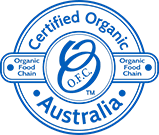| Businesses and/or products certified with OFC | |
| Templates to use in your certified business | |
| Australian Government publications related to the National Standard for Organic and Bio-Dynamic Produce | |
| General organic exporting information | |
| Documents to use to export your certified organic product |



